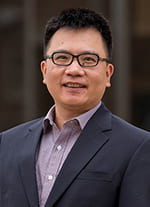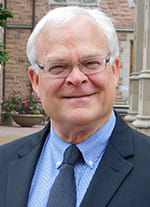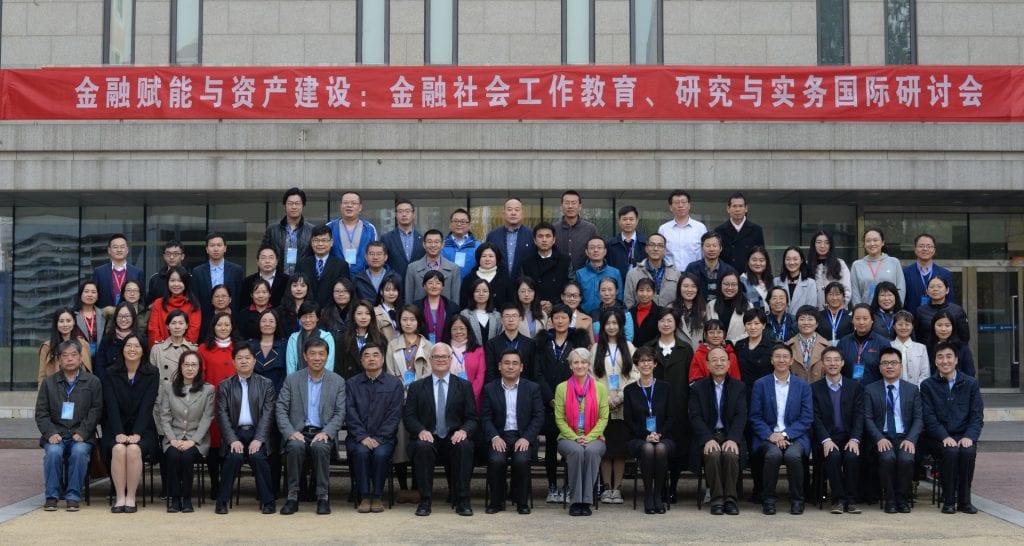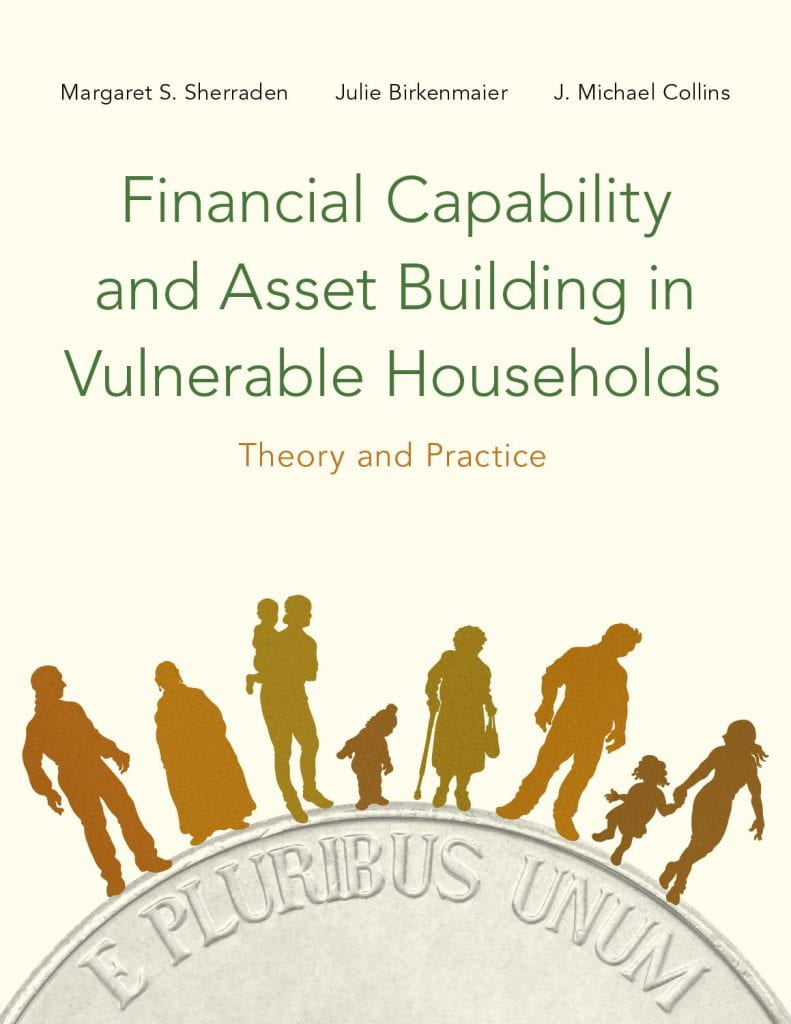How does a nation train over a million social workers to help build the financial capability and assets of their clients? What should social workers in China know about finance, and what is the best way to teach them?
Weighing these matters, researchers and several of China’s top social workers proposed changes at the First National Forum of the Financial Social Work Commission, held January 8, 2022, in Beijing.

“It’s a daunting set of questions,” said Jin Huang, a professor in the Saint Louis University School of Social Work, and a leader of research teams with the Center for Social Development (CSD) at Washington University’s Brown School. “Social workers counsel their clients on financial matters all the time but haven’t been trained for this,” said Huang.
He added, “This forum is an opportunity to discuss how we build the profession’s capacity to deliver training in financial social work. I am excited that CSD has been involved from the beginning.” Huang and the CSD team collaborated with Chinese colleagues to organize the event, which featured over 30 presentations, with a keynote address by CSD Founding Director Michael Sherraden.

“The overall goal” of these efforts, Sherraden said in his address (video), “is to use both the relationships of financial social workers and fintech innovations to strengthen families, promote economic equality and achieve common prosperity.” Sherraden is the George Warren Brown Distinguished University Professor at Washington University.
He added, “This workforce is already among the people with trusted relationships in communities. The strategy makes the most of that trust.”
Growing a social work labor force and expanding its skills
Since 2008, China has dramatically expanded the number of social workers on the mainland. By 2021, there were 1.57 million frontline social workers practicing in China, and 660,000 hold professional licenses.
“These new social workers have begun assisting clients at organizations and community stations throughout China,” said Huang. “Like social workers elsewhere in the world, they found that clients regularly share concerns about financial matters and solicit advice on financial problems.”
Through a series of events that CSD and its international partners organized at campuses in mainland China, Taiwan, Singapore and elsewhere over a decade, leaders in China’s professional social work organizations came to recognize the potential for training in financial matters and to explore what would be required.
In 2018, a symposium on financial capability in social work education drew leaders from the China Academy of Social Work, the China Association of Social Workers and the China Association of Social Work Education, which oversees training and curricula in China. The Central University of Finance and Economics hosted the event in Beijing, partnering with CSD, Saint Louis University and the Peking University-Hong Kong Polytechnic University Social Work Research Centre. Additional events followed. Discussions about strategies to broaden the financial capability of vulnerable populations turned to financial social work education, research and practice.

In 2020, the China Association of Social Work Education created the Financial Social Work Commission, which was designed in consultation with CSD experts Huang, Michael Sherraden and Margaret Sherraden, working with partners on the mainland. The national Commission serves as a strategic hub for developing curricula and educational programs on financial capability and asset development.
The first national financial capability training followed in early 2021. Through a collaboration initiated by CSD, the China Association of Social Workers, the China Association of Social Work Education, the People’s Bank of China and the microinsurance nonprofit YiBao Plan presented 22 virtual sessions developed to teach practicing professionals about financial policies, financial social work practice, financial capability programs and related topics.
Huang opened the series with an introduction to the concepts of financial capability and financial inclusion. Over 800 practitioners attended. Additional trainings were held in Beijing, Guangzhou, Chengdu, Fuzhou and Ningbo.
Other events fueled the rise of financial social work. In summer of 2021, the Chinese government announced a new campaign for “common prosperity,” drawing upon well-established themes to balance growth and social development.
Central to the government’s common prosperity strategy is the expansion of financial stability by reducing financial risk and elevating low incomes.
Calls for changes to social work education
At the Financial Social Work Commission’s January 8 forum, top social work leaders evoked the vision for common prosperity in calling for changes to the profession’s curriculum.
Huamin Peng and Xueyin Zou called for embedding financial capability content within general social work education. Peng, vice president of the China Association of Social Work Education, is a professor at Nanjing University and the Commission’s honorary chair. Zou is secretary general of the Chinese Academy of Social Work. Both leaders cited the national strategies of rural revitalization and common prosperity in calling for efforts to train bachelors- and masters-level students in financial social work.
Financial Social Work Commission Chair Guowu Li, dean of the School of Sociology and Psychology at Central University of Finance and Economics, proposed a national system for coordinating student practicums in financial social work, a national summer-camp program for bachelors- and masters-level students in the emerging field and a new effort to build an online community of financial social work educators through additional virtual training sessions.
Collectively, these proposals represent calls for systemic change from the top of the social work profession in China.
Tools for a generation of financial social workers
To effect the proposed changes, social work organizations and schools will require new resources for educators. In part, the profession’s educational experts are drawing upon, and adapting, the work of U.S. partners.

At the forum, Commission Chair Li shared the goal of publishing translations of two financial capability textbooks in the coming year, and the forum featured a panel on one of those, “Financial Capability and Asset Building in Vulnerable Households: Theory and Practice,” by Margaret Sherraden, Julie Birkenmaier, and J. Michael Collins.
The book has been translated by a team led by Shu Fang at Central University of Finance and Economics and is scheduled for publication in the fall of 2022.
Addressing the panel (video), Margaret Sherraden echoed Peng and Zou’s calls for education in financial social work. She also identified curricular priorities.
“Professional social work education should include content on financial capability, asset building and financial social work,” Sherraden said. Such instruction, she noted, should equip social workers with an understanding of household finances and financial products, as well as the basic theory, concepts and practice of financial social work. A research professor in Washington University’s Brown School and professor emerita with the School of Social Work at the University of Missouri–St. Louis, Sherraden is a pioneer in scholarship on financial capability and financial social work. She is one of the experts leading CSD’s financial capability initiative.

Sherraden emphasized that educators should pair the textbook translation with culturally appropriate illustrations from Chinese life. Several educators who have used the textbook shared strategies for incorporating content from Chinese contexts.
In a separate session, CSD’s Huang presented preliminary research he conducted with colleagues Margaret Sherraden and Lissa Johnson (video, in Chinese). The study examined financial guidance services in the United States, evaluated systems for delivering such services to vulnerable populations and proposed a delivery strategy. “The concept of financial guidance provides a new framework for social workers in China,” Huang explained, “a framework for systematically examining their financial practices beyond financial education.”
The variety of subjects represented in forum presentations illustrates an emerging understanding of financial social work that is broad in scope and extends well beyond the bounds of one-on-one interactions with service clients.


In a presentation on child poverty in China, CSD Faculty Director Deng Suo, a professor at Peking University, proposed intervention to build the assets of families. CSD Faculty Director Minchao Jin, a professor at New York University Shanghai, discussed children’s financial literacy in China. Lu Zheng, of Tsinghua University, also made the case for asset-based intervention, noting rural–urban disparities and the highly structural nature of economic inequality in China.
Ning Qian, a professor at Yunnan University and the former vice president of the China Association of Social Work Education, reported on rural community asset-building projects, connecting economic development with financial social work practice.
The connection between asset-building efforts and social work is familiar to many in China, where asset-based interventions have been tested for years. In 2005, researchers from CSD and the Chinese Academy of Social Sciences worked with provincial officials in a first test of an asset-building policy. Through a 2013 partnership with Peking University, CSD also tested a program that provided asset-building accounts for children with disabilities. Numerous other interventions have been implemented since then.
Looking forward
Assessing the forum, Huang said, “The excitement in this new field is widespread and it is strong.” The gathering, he added, generated substantive proposals along with energy to pursue them.
Commission Chair Li announced plans to convene a second forum and to develop a body of scholarly publications that support the Commission’s work.
In his address, Michael Sherraden set the effort within a broader national context: “As my colleague Jin Huang often says, ‘Financial social work practice and policy development can become a key driver in a renewed economic model in China—one that builds strong families as a foundation for internal consumption and economic stability.’” Sherraden added, “As conference participants work on the FCAB curriculum and design training in financial social work practice, let us keep this larger policy vision in mind.”
Sherraden closed his remarks by emphasizing the importance of international cooperation, saying, “Even though our governments may sometimes be at odds, the people can continue to work together constructively.”
The Center for Social Development’s contributions to this conference were funded in part by a grant from the United States Department of State. The opinions, findings and conclusions stated therein are those of the authors and do not necessarily reflect those of the United States Department of State.
